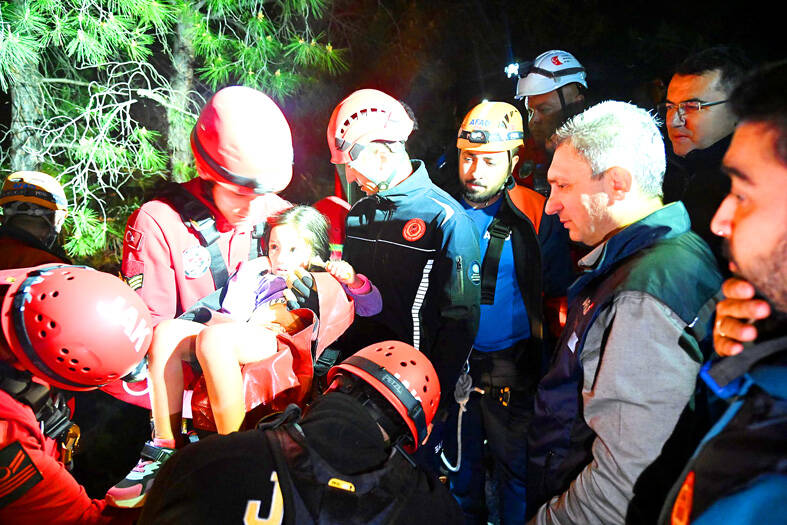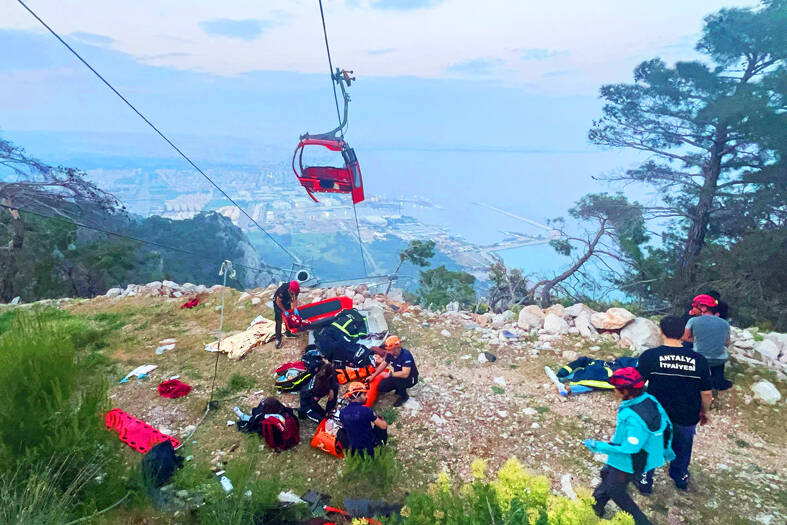One person was killed and 10 others were injured on Friday just outside the southern Turkish city of Antalya after a cable car cabin collided with a broken pole, the Turkish Ministry of the Interior said yeterday.
A total of 128 passengers were rescued from 16 cable cars, but 43 remained stranded in mid-air yesterday morning, the Turkish Disaster and Emergency Management Authority (AFAD) said.
Seven helicopters and more than 500 rescuers, including specialist mountaineers, were at the scene, authorities said.

Photo: Antalya Governorship via EPA-EFE
A video released by the Turkish Ministry of the Interior showed rescue personnel tied to safety ropes climbing into cabins.
Two children were among the injured in the accident, the state-run Anadolu Agency said.
Anadolu identified the deceased as a 54-year-old Turkish man.

Photo: Dia Images via AP
Images in Turkish media showed the battered car swaying from dislodged cables on the side of the rocky mountain as medics tended the wounded.
Friday was the final day of a three-day public holiday in Turkey marking the end of the Muslim holy month of Ramadan, which sees families flock to coastal resorts.
The cable car carries tourists from Konyaalti beach to a restaurant and viewing platform at the summit of the 618m Tunektepe peak. It is run by Antalya Metropolitan Municipality.
The cable car has 36 cabins with a capacity of six people each, and it takes an average of nine minutes to go uphill to the Tunektepe facility, information on its Web site says.
The Antalya Chief Public Prosecutor’s Office has launched an investigation. An expert commission including mechanical and electrical engineers and health and safety experts was assigned to determine the cause of the incident.

The team behind the long-awaited Vera Rubin Observatory in Chile yesterday published their first images, revealing breathtaking views of star-forming regions as well as distant galaxies. More than two decades in the making, the giant US-funded telescope sits perched at the summit of Cerro Pachon in central Chile, where dark skies and dry air provide ideal conditions for observing the cosmos. One of the debut images is a composite of 678 exposures taken over just seven hours, capturing the Trifid Nebula and the Lagoon Nebula — both several thousand light-years from Earth — glowing in vivid pinks against orange-red backdrops. The new image

Canada and the EU on Monday signed a defense and security pact as the transatlantic partners seek to better confront Russia, with worries over Washington’s reliability under US President Donald Trump. The deal was announced after a summit in Brussels between Canadian Prime Minister Mark Carney and European Commission President Ursula von der Leyen and European Council President Antonio Costa. “While NATO remains the cornerstone of our collective defense, this partnership will allow us to strengthen our preparedness ... to invest more and to invest smarter,” Costa told a news conference. “It opens new opportunities for companies on both sides of the

ESPIONAGE: The British government’s decision on the proposed embassy hinges on the security of underground data cables, a former diplomat has said A US intervention over China’s proposed new embassy in London has thrown a potential resolution “up in the air,” campaigners have said, amid concerns over the site’s proximity to a sensitive hub of critical communication cables. The furor over a new “super-embassy” on the edge of London’s financial district was reignited last week when the White House said it was “deeply concerned” over potential Chinese access to “the sensitive communications of one of our closest allies.” The Dutch parliament has also raised concerns about Beijing’s ideal location of Royal Mint Court, on the edge of the City of London, which has so

OVERHAUL: The move would likely mark the end to Voice of America, which was founded in 1942 to counter Nazi propaganda and operated in nearly 50 languages The parent agency of Voice of America (VOA) on Friday said it had issued termination notices to more than 639 more staff, completing an 85 percent decrease in personnel since March and effectively spelling the end of a broadcasting network founded to counter Nazi propaganda. US Agency for Global Media (USAGM) senior advisor Kari Lake said the staff reduction meant 1,400 positions had been eliminated as part of US President Donald Trump’s agenda to cut staffing at the agency to a statutory minimum. “Reduction in Force Termination Notices were sent to 639 employees at USAGM and Voice of America, part of a